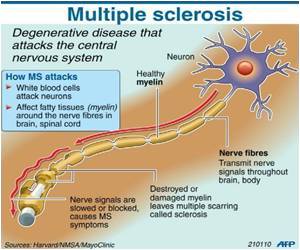Multiple sclerosis is a disabling disease that affects millions of people worldwide. Alemtuzumab drug may reverse disability in patients, claims study.
Highlights
- Alemtuzumab is a drug prescribed for multiple sclerosis patients who do not respond to other drugs.
- Multiple sclerosis drugs could reverse physical disability caused by the disease, claims a new study.
- Patients who received alemtuzumab had improved on a disability test by at least one point.
- The drug also improved the thinking skills of the patients with multiple sclerosis.
Multiple sclerosis is a disabling disease that affects the brain and spinal cord. A drug called alemtuzumab could reverse some of the physical disability caused by multiple sclerosis, claims a new research. Alemtuzumab could cause some serious side effects. Thus, it is not prescribed for all the patients with multiple sclerosis. However, it is prescribed for people who have not responded well to other multiple sclerosis drugs. Alemtuzumab is used in relapsing-remitting multiple sclerosis, which is the most common form of the disease. In relapsing-remitting multiple sclerosis, the symptoms alternate between sudden worsening and remission.
Dr. Gavin Giovannon, of Queen Mary University of London, United Kingdom, also lead author of the study, said, “While many multiple sclerosis drugs slow the progress of disability, there have been little data about the ability of current treatments to help restore function previously lost to MS."
Alemtuzumab Could Reverse Physical Disability in Multiple Sclerosis Patients
The researchers recruited people with relapsing-remitting multiple sclerosis who did not respond well to other drugs. The participants were divided into two groups. Group one comprised of 426 people who were treated with alemtuzumab. Group two comprised a total of 202 participants who were treated with the drug interferon beta-1a.Disability Test
The participants’ level of disability were assessed at the beginning of the study and again every three months for two years. At the end of the study period, the results showed that nearly 28 percent of the participants who received alemtuzumab had improved by at least one point in the disability test, with the scores ranging from 0 to 10. While the participants’ who received the drug interferon beta-1a showed improvement by only 15 percent.
Lead researcher Giovannoni said that if the benefits of alemtuzumab were confirmed, the risks associated with the drug should also be considered. The risks include serious and rarely fatal autoimmune problems as well as infusion reactions.
"Longer studies are also needed to see how many people experience, or do not experience, improvement in disability over longer periods of time," added Dr. Bielekova, who is a Fellow of the American Academy of Neurology.
The study is published in the journal Neurology, a medical journal of the American Academy of Neurology.
Multiple Sclerosis
The immune system attacks the myelin (protective sheath that covers nerve fibers). The symptoms include blurred vision, loss of balance, poor coordination, tremors, fatigue, problems with memory and concentration. The symptoms may worsen over time. The damage can cause communication problems between the brain and the body. Multiple sclerosis can cause the nerves to deteriorate and become permanently damaged.
Facts About Multiple Sclerosis
- Multiple sclerosis affects more than 2,500,000 people in the world.
- More than 400,000 people in the United States have multiple sclerosis.
- More than one million new cases are diagnosed in India.
- Multiple sclerosis affects more women than men. It begins between the ages of 20 and 40.
- People with type 1 diabetes, thyroid disorder, and inflammatory bowel disease are at increased risk of developing multiple sclerosis.
- MS drug may reverse some physical disability - https://www.eurekalert.org/emb_releases/2016-10/aaon-mdm100716.php)
- Multiple Sclerosis - (https://medlineplus.gov/multiplesclerosis.html)
- Overview Multiple sclerosis - (http://www.mayoclinic.org/diseases-conditions/multiple-sclerosis/home/ovc-20131882)
- What is multiple sclerosis? - (http://www.nationalmssociety.org/What-is-MS/MS-FAQ-s)
















